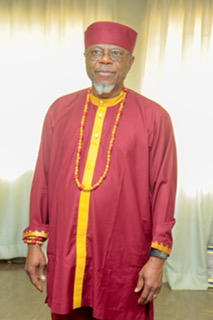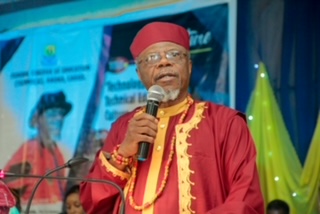BY Toyin Falola

The cultural orientation and conviction of a set of people define the core of their existence. It is the window through which society and its members could be understood. The renowned anthropologist Edward Tylor, in his badly titled book, Primitive Culture, explains culture as “that complex whole which includes knowledge, belief, art, law, morals, custom, and any other capabilities and habits acquired by man as a member of society.” Such a complex whole comprises individuals’ primary belief system and explains why it defines their core. As a result, it is easy to understand why technological innovations and their applications could create a subconscious conflict and, in the worst case, a conscious conflict between what people had accepted to be the right way of doing things and what the new approach is trying to enact. Viewing technology from the angle of what Jennifer D. Slack and J. Macgregor Wise refer to as “received view” in Culture + Technology: A Primer is progress, causality, convenience, and other concepts that put it at a polar position to culture. While this may not be entirely untrue, technology is not a necessary alternative to culture but could be culture itself.
Referring to and relating culture to technology is hinged on the idea that technology is the application of science. In essence, science has existed as long as humans have been able to comprehend and analyze things, and the application of science is the basic definition of technology. This emphasizes that technology is also as old as humans, and they adopt and use the different inventions and discoveries of the human species. If then culture comprises the continuous uses, enduring systems and artefacts, knowledge, law, and every other thing captured by Edward Tylor, it is safe to say that today’s culture is yesterday’s new technological breakthrough. This brings us to the logical conclusion that technology can be old or new, that older technology is today’s culture, and that culture and technology can be the same. As a result of this and concerning Africa, technology is not a new concept or idea; it could be said to be as old as the culture of the people themselves.
Unlike some ethnocentric scholars who posited that Africa was in a long period of developmental darkness until the discovery and contact with the Europeans, Africa’s civilization and technology, like what Hegel proposed in his Lectures on the Philosophy of World History, has been a centre of different technological breakthroughs and have been recorded and discovered to be a centre of various technological civilizations and inventions earlier than some other societies. For instance, different studies like those of Posnansky (1981: 542-47), Harlan et al. (1976), Shaw (1981), Schmidt (1978: 292-96), Shinnie (1971: 93-94), among others, have put the introduction and practice of metallurgy and agriculture in Africa earlier than it was seen in Europe and the Middle East. More specifically, the Egyptian calendar of 4231 BC, although adjusted in 3200 BC and 2773 BC, has evidence of old discoveries of Africa. Other notable examples include the use and designs of terracotta in the Nok culture as early as 1500 BC, the Proto-Saharan writing, Mathematical developments, arts, architecture, and medicines, have shown that technology cannot be said to be new to African society.
Over the years, these technological discoveries and practices developed and formed a belief system and concept that we refer to as culture today. Hence, the current conversation on the latest technology should relate to what is now considered modern technology; otherwise, it would undermine the historical breakthroughs in Africa. The introduction of modern technology, especially after the contacts with the Europeans, has clashed with the culture of the people. The first problem is that there had to be a radical adjustment to new ways of doing things that many people are yet to embrace. These technological advancements have not considered the people’s cultural convictions to allow gradual adoption.
Kabiru Kinyanjui in Culture, Technology and Sustainable Development in Africa posits that the influx of modern technological advancements, combined with colonialism, suppressed cultural confidence, creating heavy reliance on them and disregard for indigenous cultural advancement. This was faced with hostile reactions from the indigenous groups, and when they had no choice but to accept them, they found it quite difficult to handle. However, with the development of institutions to promote science and technology, the bridges between them were created, allowing for adaptation and adoption. To bolster this, the National Council for Science and Technology (NCST) was established to advance the study of science and technology, with emphasis on research, allowing modern technology to thrive in Nigeria. Also, Africans have tried to resist many western developments because they believe technology can consume valuable cultural values that are still beneficial to society. When considering the cultural history of the people, social decadence and an increase in social vices are considered possible results of the adoption of new developments and technology without sieving out the parts that are not favourable.
The enthronement of technological advancement over African culture could be considered a subtle kind of neo-colonialism. It creates a measure of control when access to these developments is either not directly available in Africa or requires certain commitments. Economic and capitalist interest in introducing technological innovations to replace cultural approaches and materials have also been arguments favouring subconscious neo-colonialism. Another source of concern for Africans about the radical importation of technological advancement without independence is the tendency to unconsciously allow over-reliance on and the preference for modern technology kill the cultures that made it African and break the sociological threads of African society.
However, technology is not necessarily a contradiction of culture, and with understanding, the seeming conflicts might be needless. It is a way of developing the current cultural approaches to things and their distribution and diffusion to other parts of the world. The advancement of technology has been responsible for the spread of European culture. Although using the same for Africa may seem late, it might also spread African culture. As observed by Stephen A. Akintoye in A History of the Yoruba People, the culture of Yoruba and Benin had spread all over the world, with evidential practices in Brazil, the United Kingdom, United States, Argentina, Cuba, the Dominican Republic, among others, as a result of heavy immigration from Africa to these places. Presently, there is a reasonable use of African fashion senses and styles worldwide, and the current globalization and technology drive has taken African cultures across the world.
In Africa, some of these technological developments and practices have evolved into specific professions with a long line of history attributed to them. The makers of Adire, Aso Oke, Aso Ofi in the textile industry, the Agbede blacksmiths’ profession, among others, especially in the Yoruba regions of Nigeria, required an application of specific techniques, which could also be regarded as technological innovations. These professions developed their education systems, and the trade culture is always passed through them. This brings us to the realization of how technical education has operated throughout Nigeria’s history. Africa’s most common teaching method is the apprenticeship system, which is connected with social responsibility and confers social status to those learning and the teachers.
As observed by W. Ahadzie (2009), children are often taken to learn several skills at an early age. Many of these professionals were family professionals, so children are easily incorporated into it. The apprentice is controlled gravely by the interests of the master, and the master is responsible for the apprentice. Among other things, these systems made the facilitation of technical education easier. Given the relative success of the cultural process of technical education before colonialism and contact with Europe, it is clear that some of these processes can be adapted to improve technical education in the current dispensation. Although there is evidence of the use of apprenticeship in the modern technical educational system, particularly with different internship programs made compulsory for students in technology disciplines in the form of Industrial Trainings and SIWES and those taking professional courses, there is still a need for more emphasis and constructive structures for the system.
More time should be set aside for students to interact with practising experts in their fields to visualize what they are learning. Also, as observed by Kwesi Kwaa Prah in The Intellectualisation of African Languages for Higher Education, the continuous development in the intellectualization of African languages is a way of closing the gap between culture and technology. The level of understanding of modern technology will be increased if technical courses or processes are developed and taught so that African languages have ready representations, explanations, and terms for them. Such endeavour would also embrace the illiterate generation of the population that does not have the opportunity to acquire formal education. This is because technological products are beneficial to everyone, not only to the youth, literate, or the new generation.
In conclusion, the co-existence of modern technology and culture in Nigerian society might be the developmental breakthrough that the country has been waiting for. This is because there will be a high tendency for technological innovations to originate from the country. Moreover, this would foster the technical know-how in many sectors of the economy and guarantee national development. There would also exist a comprehensive methodological approach to issues challenging the nation’s progress.
- Excerpt of a public lecture delivered by Prof Falola Part at the Federal College of Education (Technical), Akoka, Lagos, on March 2nd, 2022.


